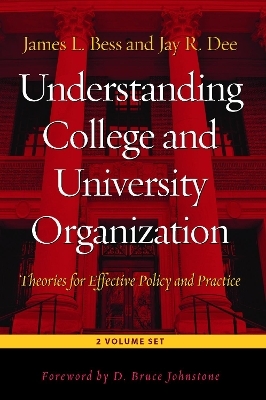
Understanding College and University Organization
Stylus Publishing
978-1-57922-770-8 (ISBN)
- Titel z.Zt. nicht lieferbar
- Versandkostenfrei
- Auch auf Rechnung
- Artikel merken
James L. Bess is President of James L. Bess & Associates and Professor Emeritus at New York University, where he taught from 1980-2000. He is the author or editor of eight books and over fifty articles and book chapters. Jay R. Dee is Associate Professor of Higher Education, Graduate College of Education, University of Massachusetts, Boston. D. Bruce Johnstone is Distinguished Service Professor of Higher and Comparative Education at the State University of New York at Buffalo. He is director of the International Comparative Higher Education Finance and Accessibility Project. Dr. Johnstone has held posts of vice president for administration at the University of Pennsylvania, president of the State University College of Buffalo, and chancellor of the State University of New York system.
Each begins with a preview of its key points and includes a case drawn from recent situations experienced by practitioners. The cases provide concrete experiential “data” against which the theories in each can be tested, validated, and compared with situations that readers encounter at their home institutions. Questions are provided about each case to stimulate reflection on and discussion of the multiple issues raised. Each includes an extensive bibliography on the topic. Volume II. Dynamics of the System Volume II deals with the more dynamic conditions of organizations–conditions that arise less predictably and that often challenge the status quo. It addresses the management of conflict, power and politics in higher education, types and stages of organizational decision-making, managerial and individuals’ styles and roles in decision-making, organizational learning, strategy, accountability and assessments of effectiveness, change and the complexities and challenges associated with organization-wide change, and finally, approaches to leadership. While this volume refers to and utilizes concepts and theories introduced in Volume One, it can be read and understood independently. TABLE OF CONTENTS Problem-to-Theory Application Table Foreword by D. Bruce Johnstone About the Authors Acknowledgements Preface 1. Overview 2. Conflict in Organizations 3. Power and Politics in Higher Education Organizations 4. Organizational Decision Making 5. Individual Decision Making 6. Organizational Learning 7. Organizational Strategy 8. Organizational Goals, Effectiveness, and Efficiency 9. Organizational Change in Higher Education 10. Leadership 11. The End and the Beginning. Fresh Thoughts About Organizational Theory and Higher Education SUBJECT INDEX AUTHOR INDEX
| Sprache | englisch |
|---|---|
| Maße | 152 x 229 mm |
| Gewicht | 1456 g |
| Themenwelt | Sozialwissenschaften ► Pädagogik ► Erwachsenenbildung |
| ISBN-10 | 1-57922-770-8 / 1579227708 |
| ISBN-13 | 978-1-57922-770-8 / 9781579227708 |
| Zustand | Neuware |
| Haben Sie eine Frage zum Produkt? |
aus dem Bereich


